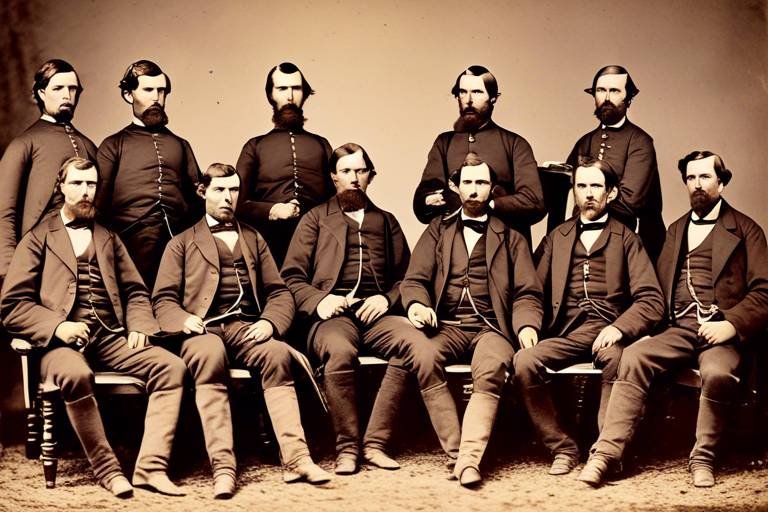The History of Colonialism in Africa
Exploring the impact of European colonialism on the African continent reveals a complex and tumultuous history that continues to shape the region to this day. The arrival of European powers in Africa marked a significant turning point, bringing about profound economic, social, and cultural changes that have left a lasting legacy.

Origins of Colonialism in Africa
Exploring the impact of European colonialism on the African continent, including the economic, social, and cultural consequences that continue to shape the region today.
The origins of colonialism in Africa can be traced back to the historical context of European powers seeking to expand their empires and influence. During the late 19th century, a period known as the "Scramble for Africa," European nations raced to claim territories on the continent for various reasons. The primary motivations behind colonization included the exploitation of Africa's abundant natural resources, the establishment of trade routes, and the desire for strategic military positions to enhance global power and prestige.

Colonial Rule and Administration
During the era of European colonialism in Africa, the methods and structures of colonial rule and administration played a crucial role in shaping the continent's trajectory. European powers implemented various governance strategies to assert control over the vast and diverse African territories, each with its own unique challenges and consequences.
One of the key approaches to colonial administration was the concept of indirect rule, where European powers appointed local leaders or collaborators to govern on their behalf. This system allowed for the preservation of existing power structures and traditional authorities, while still ensuring European control and influence.
Conversely, assimilation policies aimed to transform African societies to mirror European norms and values. This approach often involved imposing Western education, legal systems, and languages, with the goal of eradicating indigenous cultures and identities in favor of European ideals.
Moreover, colonial powers exploited local labor and resources to fuel their own economies, leading to widespread exploitation and economic dependency. The extraction of natural resources, such as minerals, timber, and agricultural products, was a central aspect of colonial rule, contributing to long-term inequalities and underdevelopment in many African regions.
Additionally, the administrative structures put in place by colonial powers were often designed to serve the interests of the colonizers rather than the colonized. Bureaucracies were established to facilitate resource extraction and maintain control, often at the expense of local autonomy and self-governance.
Overall, the legacy of colonial rule and administration continues to impact Africa to this day, influencing political systems, economic disparities, and social dynamics across the continent. Understanding the complexities of colonial governance is essential in comprehending the challenges faced by many African nations in their quest for development and self-determination.

Resistance and Independence Movements
Exploring the impact of European colonialism on the African continent, including the economic, social, and cultural consequences that continue to shape the region today.
Examining the historical context and motivations behind European powers' colonization of Africa, including the scramble for resources, strategic interests, and the quest for power and prestige.
Discussing the methods and structures of colonial governance implemented by European powers in Africa, such as indirect rule, assimilation policies, and the exploitation of local labor and resources.
Exploring the various forms of resistance and struggles for independence against colonial rule in Africa, highlighting key figures, events, and movements that led to decolonization.
Resistance against colonial powers in Africa took various forms, from diplomatic protests to armed uprisings. Leaders like Jomo Kenyatta in Kenya and Kwame Nkrumah in Ghana emerged as prominent figures in the fight for independence. Movements such as the Mau Mau Uprising in Kenya and the Algerian War of Independence were pivotal in challenging colonial dominance. These movements were not only about political freedom but also about reclaiming African identity and autonomy.
Analyzing the social transformations brought about by colonialism in Africa, including changes in demographics, education, healthcare, and the erosion of traditional cultural practices.
Examining how colonial powers exploited Africa's natural resources, labor force, and markets for their own economic gain, leading to long-lasting inequalities and underdevelopment.
Discussing the ways in which colonialism imposed Western values, languages, and norms on African societies, resulting in the erosion of indigenous cultures and identities.
Reflecting on the enduring impact of colonialism on contemporary African politics, economics, and social dynamics, and the ongoing challenges of post-colonial nation-building and development.
Considering the calls for reparations, apologies, and reconciliation efforts to address the historical injustices and inequalities perpetuated by colonialism in Africa, and the quest for healing and justice.

Impact of Colonialism on African Societies
Colonialism in Africa had a profound impact on the societies of the continent, bringing about significant social transformations that continue to influence the region to this day. One of the key consequences of colonial rule was the demographic changes that occurred as a result of forced labor practices and population displacement. Indigenous populations were often exploited for labor in mines, plantations, and other industries, leading to disruptions in traditional social structures and communities.
Furthermore, the introduction of Western education and healthcare systems by colonial powers also had a lasting impact on African societies. While these systems brought some benefits in terms of improved literacy and healthcare outcomes, they were often implemented in a way that undermined local knowledge and practices. This led to a loss of traditional healing methods and cultural practices, contributing to the erosion of indigenous identities.
Moreover, colonialism played a significant role in reshaping the social hierarchies within African societies. The imposition of European values and norms led to the marginalization of indigenous belief systems and customs, as well as the elevation of Western ideals as superior. This cultural hegemony resulted in a loss of cultural autonomy and identity for many African communities, as they were compelled to conform to foreign standards of behavior and dress.

Economic Exploitation and Resource Extraction
European colonial powers engaged in extensive economic exploitation and resource extraction in Africa, significantly impacting the continent's development and prosperity. The primary goal of colonialism was to extract valuable resources from Africa to fuel the industrial revolution in Europe. This exploitation was carried out through various means, including the establishment of cash crop plantations, mining operations, and forced labor practices.
Colonial powers exploited Africa's natural resources such as gold, diamonds, ivory, and minerals, often without regard for the environmental or social consequences. The extraction of these resources led to the depletion of local reserves, environmental degradation, and the displacement of indigenous communities from their lands. Moreover, the profits generated from resource extraction were largely repatriated to the colonizing countries, contributing to the economic underdevelopment of Africa.
The economic exploitation of Africa also extended to the manipulation of local markets and trade systems. Colonial powers imposed trade policies that favored their own industries and products, while restricting the development of local industries in Africa. This unequal trade relationship further entrenched Africa's dependency on European markets and perpetuated economic disparities between the colonizers and the colonized.
Furthermore, the labor practices employed by colonial powers in Africa were often exploitative and oppressive. Africans were forced to work in harsh conditions on plantations, mines, and construction projects, with little to no compensation or rights. The labor force was systematically exploited to maximize profits for the colonizers, leading to widespread poverty, inequality, and social unrest in African societies.
The legacy of economic exploitation and resource extraction during the colonial era continues to impact Africa's economy and development today. The inequalities and imbalances created by colonialism have persisted, hindering the continent's ability to achieve sustainable growth and prosperity. Addressing the historical injustices of economic exploitation is crucial for promoting economic justice, sustainable development, and social equity in Africa.

Cultural Hegemony and Identity Loss
When European colonial powers established control over African territories, they not only imposed political and economic dominance but also sought to assert cultural superiority. This cultural hegemony involved the imposition of Western values, languages, and norms on indigenous African societies, often at the expense of local traditions and identities. The colonial education system, for example, promoted European languages and histories while marginalizing African languages and knowledge systems. This led to a gradual erosion of indigenous cultures and identities, as younger generations were socialized into embracing Western ideals and rejecting their own heritage.

Legacy of Colonialism in Modern Africa
The legacy of colonialism continues to cast a long shadow over modern Africa, influencing various aspects of the continent's politics, economics, and social fabric. The impact of European colonization, which aimed to exploit Africa's resources and establish dominance, has left lasting scars that are still felt today.
One of the most significant legacies of colonialism is the arbitrary borders drawn by European powers, often without consideration for ethnic or cultural divisions. This has led to ongoing conflicts and struggles for power among different groups within African nations. The legacy of artificial borders continues to shape political dynamics, as various ethnicities and tribes navigate the challenges of governance and representation.
Furthermore, the economic structures established during colonial rule have had a lasting impact on Africa's development. The extraction of natural resources for the benefit of colonial powers has left many African countries struggling with economic dependence and underdevelopment. The legacy of economic exploitation continues to contribute to inequalities and challenges in achieving sustainable development.
Colonialism also imposed Western values, languages, and institutions on African societies, often at the expense of indigenous cultures and identities. The legacy of cultural hegemony has resulted in a complex interplay between traditional practices and modern influences, shaping the evolving identity of African nations in the contemporary world.
Moreover, the history of colonialism has influenced the relationships between African nations and former colonial powers. The legacy of exploitation and domination has fueled calls for reparations, apologies, and reconciliation efforts to address historical injustices and promote healing and justice. The ongoing discourse on colonial legacy underscores the importance of acknowledging the past to shape a more equitable and inclusive future for Africa.

Reparations and Reconciliation
Reparations and reconciliation are crucial aspects of addressing the historical injustices and inequalities perpetuated by colonialism in Africa. The calls for reparations stem from the recognition of the severe economic exploitation and cultural degradation inflicted upon African societies during the colonial era. Many argue that former colonial powers should acknowledge their role in perpetuating these injustices and take responsibility for the lasting impact on African nations.
Reparations can take various forms, including financial compensation, investments in infrastructure and development projects, educational initiatives, and cultural restitution. These efforts aim to rectify the imbalances created by centuries of exploitation and to support the socio-economic advancement of African communities. By acknowledging the wrongs of the past and actively working towards restitution, former colonial powers can contribute to healing the wounds of colonialism and fostering reconciliation.
Reconciliation efforts also involve fostering dialogue and understanding between former colonizers and colonized nations. This process requires open communication, mutual respect, and a willingness to confront the difficult truths of history. Through initiatives such as truth and reconciliation commissions, educational programs, and cultural exchanges, societies can work towards healing the deep-seated wounds of colonialism and building a more inclusive and equitable future.
Frequently Asked Questions
- What were the main reasons for European colonialism in Africa?
European colonialism in Africa was primarily driven by the scramble for valuable resources, strategic interests, and the desire for power and prestige. European powers sought to exploit Africa's natural wealth, establish trade routes, and expand their empires.
- How did colonial powers govern African territories?
Colonial powers in Africa implemented various methods of governance, including indirect rule, assimilation policies, and the exploitation of local labor and resources. They often used local intermediaries to administer the territories, while maintaining control over key decision-making processes.
- What were some of the key resistance movements against colonial rule in Africa?
Africa saw numerous resistance movements against colonial rule, led by key figures such as Nelson Mandela, Jomo Kenyatta, and Kwame Nkrumah. These movements used various tactics, including armed struggle, civil disobedience, and diplomatic efforts, to challenge colonial authority and fight for independence.
- How has colonialism impacted modern African societies?
Colonialism has left a lasting impact on modern African societies, shaping their politics, economies, and social structures. The legacy of colonialism is evident in issues such as political instability, economic disparities, and cultural identity struggles that continue to affect the continent today.
- What are some of the calls for reparations and reconciliation efforts in post-colonial Africa?
There have been ongoing calls for reparations, apologies, and reconciliation efforts to address the historical injustices and inequalities perpetuated by colonialism in Africa. These efforts aim to acknowledge past wrongs, promote healing, and work towards a more just and equitable future for all Africans.



















